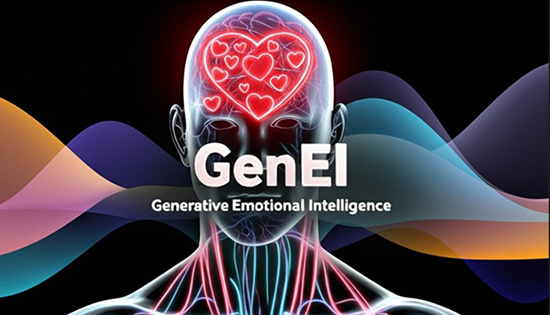Emotional Intelligence Meets GenAI: Reimagining the Future of Education
The rapid integration of Generative AI (GenAI) into classrooms has unlocked a world of possibilities. From AI-powered tutors to automated grading and personalized content generation, the education sector is riding a wave of digital transformation. But amid all the excitement, one essential human quality risks being left behind: Emotional Intelligence (EI).

At its core, emotional intelligence is the ability to understand, interpret, and respond to emotions our own and those of others. In a learning environment, this skill is not optional; it’s fundamental. Teachers rely on it to nurture student growth, and students use it to navigate collaboration, manage stress, and stay motivated.
But what happens when GenAI takes a more active role in the educational experience? Can machines exhibit empathy? Can they detect a student’s anxiety before an exam or encourage a struggling learner in a moment of self-doubt?
Right now, the answer is: not quite.

The Problem with Emotionless Intelligence
GenAI is exceptionally good at tasks like summarizing texts, answering questions, and generating essays. However, it typically lacks contextual awareness about how something should be said based on the learner’s emotional state or background. An AI tutor might offer a technically correct response, but fail to sense if the learner is confused, overwhelmed, or discouraged.
This is where integrating emotional intelligence into AI becomes not just a bonus but a necessity.
Bridging the Gap: Emotionally-Aware AI in the Classroom
Imagine an AI-powered writing assistant that not only checks grammar and structure but also evaluates emotional tone. It could prompt a student with feedback like:
“This essay sounds accurate, but lacks empathy. Would you like to try rephrasing it to sound more supportive or reflective?”
Or consider a virtual learning companion that tracks a student’s behavior and patterns. If a student shows signs of disengagement long response times, sudden drop in performance, negative sentiment in answers it could gently offer encouraging messages, suggest breaks, or even alert human educators for intervention.
These are not distant dreams. With advances in affective computing and sentiment analysis, emotionally intelligent GenAI tools are becoming possible.
Why This Matters?
Education is not just about facts and figures. It’s about people their stories, struggles, curiosity, and potential. If we deploy AI that can’t perceive or respond to these human elements, we risk creating a cold, disconnected system.
On the other hand, when we combine the computational brilliance of GenAI with the empathic depth of emotional intelligence, we create a more inclusive, responsive, and supportive learning environment. One where technology doesn’t replace the human touch, but enhances it.
The Path Ahead
The future of education will depend not just on how smart our systems are but how emotionally smart they are. To get there, developers, educators, and researchers must collaborate to build GenAI tools that:
- Detect and adapt to emotional cues
- Provide feedback that’s not just correct, but compassionate
- Promote reflective thinking, empathy, and resilience
- Encourage emotionally rich communication, especially in creative and collaborative tasks
“We must teach our AI not just to pass tests, but to understand the human journey of learning.”
Related News
School holidays for Election : New announcement
All schools across Sri Lanka will be closed on 05 and 06 May in view of the upcoming 2025 Local Government Elections.…
Read MoreEmotional Intelligence Meets GenAI: Reimagining the Future of Education
The rapid integration of Generative AI (GenAI) into classrooms has unlocked a world of possibilities. From AI-powered tutors to automated grading and…
Read MoreAYUSH Scholarship Scheme by Government of India
High Commission of India, Colombo is pleased to announce scholarships for Sri Lankan nationals under the AYUSH Scholarship Scheme for courses ranging…
Read MoreCommanding Respect, Not Fear: The Modern Leader’s Approach to Team Management
Influence, vision and the capacity to lead a group of people toward shared objectives are more important components of effective leadership than…
Read MoreRedefining Education: ANC Launches Futuristic Academic Hub in the Heart of Colombo
A Bold Leap into the Future of Higher Education April 21st, 2025 – ANC Education, Sri Lanka’s pioneering private higher education provider…
Read MoreCourses
-

IMC – Bachelor of Psychology
IMC Education Overview IMC Campus in partnership with Lincoln University College (LUC) Malaysia offers Bachelor of Psychology Degree right here in Sri… -

ANC – BA (Hons) International Business Management (Top-Up)
ANC Education Overview Designed in partnership with public and private business organizations, this program develops one’s ability to critically evaluate business models… -

IIT – BSc (Hons) Computer Science
IIT Campus Overview BSc (Hons) Computer Science provides a solid foundation and training regarding the fundamentals of the computer science field, along… -

APIIT – BSc (Hons) Cyber Security
APIIT Sri Lanka Overview Our BSc (Hons) Cyber Security award is designed to launch your future career in the protection of software… -

ICBS – BSC (Hons) Business Management with Marketing Management
ICBS Overview The BSc (Hons) Business Management with Marketing program, awarded by Queen Margaret University (QMU), is a highly regarded degree that… -

UTS – Diploma of Science
UTS College Sri Lanka Overview The Diploma of Science is designed to empower you to apply scientific thinking and analysis to important… -

CSA – Master of Architecture and Environmental Design
City School of Architecture Overview The Master of Architecture and Environmental Design Degree at CSA is awarded by the University of the… -

APIIT – BSc (Hons) International Business Management
APIIT Sri Lanka Overview Increasingly businesses are becoming more and more international. This requires business management professionals to have knowledge, skills and… -

IIT – BSc (Hons) Artificial Intelligence And Data Science
IIT Campus Overview The BSc (Hons) Artificial Intelligence and Data Science course is awarded by Robert Gordon University (RGU) in the UK… -

ICBS – International Degree Foundation in Business / IT
ICBS Overview The Scottish Qualification Authority (SQA) is a globally recognized organization dedicated to education and qualification development. SQA is responsible for… -

APIIT – BA (Hons) Finance and Business Enterprise
APIIT Sri Lanka Overview Finance and accounting are no longer just about taxation and the management of financial capital. This award will… -

APIIT – MBA General
APIIT Sri Lanka Overview The MBA is awarded by Staffordshire University, UK. This award is an advanced course of study in management… -

ANC – LLM in International Business & Commercial Law
ANC Education Overview This course is designed for graduates of law, business and finance in a legal or a corporate job role… -

AOD – BA (Hons) Fashion Design and Marketing
Academy of Design Overview The syllabus is from the UK’s Northumbria University, as one of their most revered flagship programmes and is… -

APIIT – MSc. Marketing Management
APIIT Sri Lanka Overview This MSc Marketing Management degree – awarded by Staffordshire University, UK is an advanced course of study in…
Newswire
-

Siri Dalada Vandanawa : Public told not to enter Kandy until further notice
ON: April 24, 2025 -

Pope Francis : President offers condolences at Vatican Embassy
ON: April 24, 2025 -

Weligama shooting : Former CCD Director granted bail
ON: April 24, 2025 -

School holidays for Election : New announcement
ON: April 24, 2025











